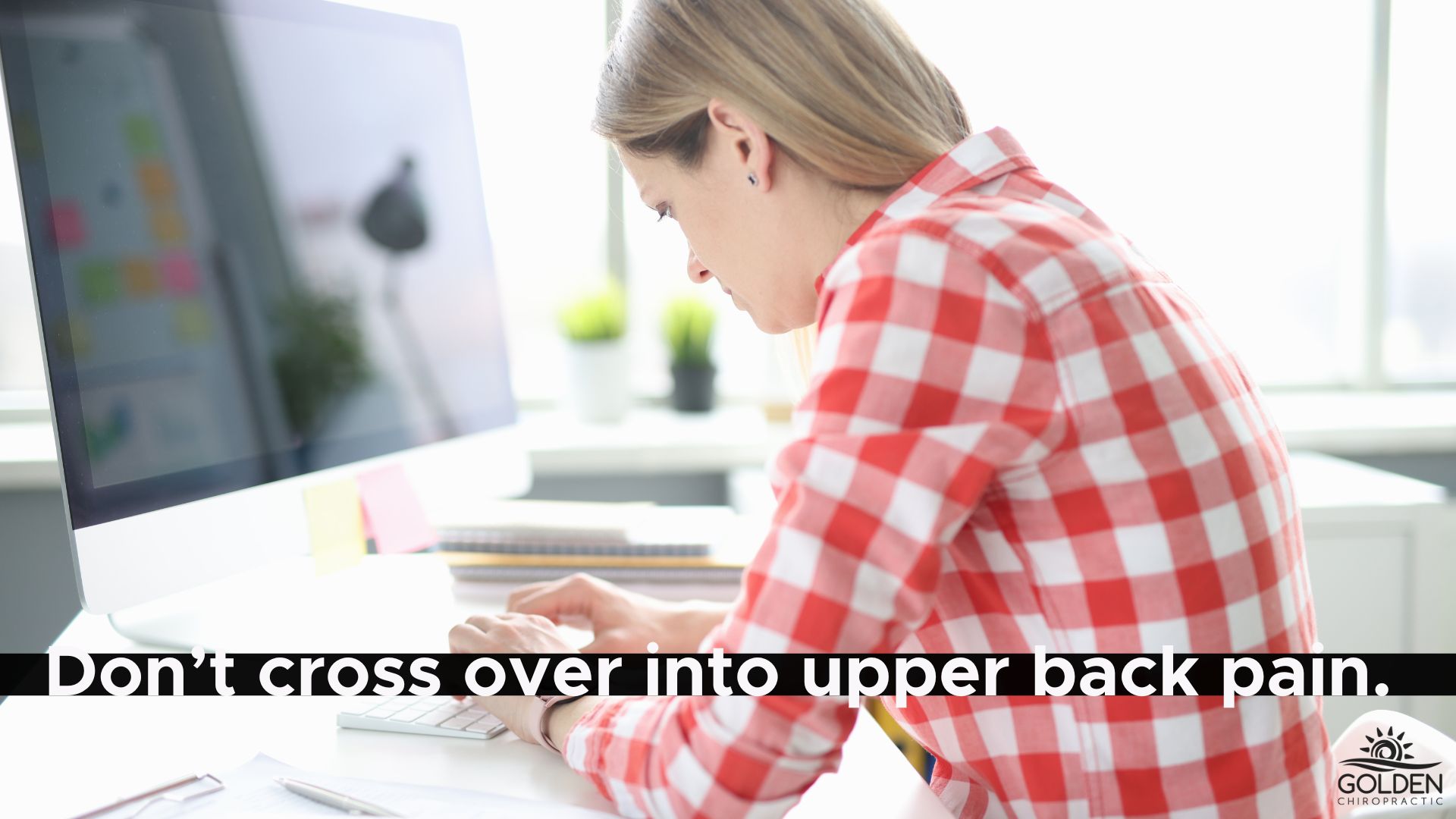
06/20/2024 by Dr. Joe Bell
Could It Be “Silicon Valley Syndrome?”
Chronic neck and upper back pain are common symptoms of a condition nicknamed “Silicon Valley Syndrome.” As chiropractors, we officially call it Upper Cross Syndrome (UCS).
Upper Cross Syndrome is a postural condition, due primarily to repetitive, improper ergonomics. If your job requires long hours at a desk, and you're too busy to focus on your posture, you could have "Silicon Valley Syndrome."
UCS has other causes, too. Maybe you participate in a sport like cycling that encourages maintaining the same posture for long periods of time. Maybe you’re a commuter, hunching over your steering wheel for an hour or more a day.
Regardless of the cause, UCS is a condition that disrupts your daily life, making you feel grumpy, limited, and frustrated.
Chiropractic can help you get out of UCS pain and back to enjoying your daily life.
How does your lifestyle contribute to Upper Cross Syndrome?
UCS involves muscle groups in your neck, shoulders, and upper back. Certain muscle groups become overly tight and overused, while other muscle groups become weak and inhibited.
This imbalance creates a "cross" pattern of dysfunction, leading to pain and discomfort.
The most common lifestyle factor leading to UCS is sitting for long periods with poor posture.
We recently had a female patient, a 35-year-old mother of two and an avid runner. She often found herself hunched over while tending to her children or working at her computer.
What are the symptoms of Upper Cross Syndrome?
Our runner mom's symptoms included increasing discomfort in her neck and shoulders. Her shoulders slumped forward and her head protruded. The strain in her neck and shoulders manifested as persistent headaches and stiffness.
Poor posture, along with the demands of her daily life, led to ever-increasing discomfort in her neck and shoulders. She also experienced a lot of emotional frustration.
The physical strain of UCS also affected her running, and her ability to fully engage with her family. When she visited our office, we identified UCS as the root of her pain and discomfort.
When your pectoralis major and minor (chest muscles), upper trapezius (upper back), and levator scapulae (side neck) are tight, they pull your shoulders forward and push your head out.
The above combined with weak neck flexors (the muscles responsible for bending your head forward), rhomboids (just below your neck in your back), and serratus anterior (cover the side of your ribcage) muscles make it hard to maintain good posture.
This imbalance creates a "cross" pattern of overactive and underactive muscles. This cross pattern leads to poor posture and stress on your neck, shoulders, and upper back.
Over time, this can cause chronic pain, discomfort, and reduced mobility. Many patients also experience headaches due to the increased neck tension.
Generally, symptoms of UCS can include:
- Headaches
- Neck pain
- Strain in the back of the neck
- Chest pain and tightness
- Upper back pain
- Shoulder pain
- Difficulty sitting, reading, watching television, or driving for long periods of time
- Restricted range of motion in the neck or shoulders
How do chiropractors diagnose Upper Cross Syndrome?
In our runner mom's case, with a thorough assessment, we pinpointed muscle imbalances in her neck, shoulders, and upper back.
For most patients, we diagnose UCS using patient history, postural assessment, range of motion testing, and muscle palpation.
Usually, UCS can be diagnosed without extensive imaging. However, it's possible that we'll recommend X-rays or other tests to rule out other conditions.
How do chiropractors treat Upper Cross Syndrome?
Our approach to treating UCS includes mobilization and stretching.
We may perform adjustments to relieve tightness in the upper trapezius, pectoralis, and levator scapulae muscles.
We may also help to restore proper mobility through myofascial work, electric stim, heat/cold therapy, grade IV mobilization techniques and high velocity low amplitude adjustments. These treatments can help mitigate your pain while increasing your overall range of motion.
For your self-care, we’ll likely focus on strengthening your deep neck flexors, rhomboids, and serratus anterior muscles with exercises using resistance bands and free weights. We’ll also likely help with home and work ergonomics to maximize effective postures.
How long does it take for chiropractic care to work on Upper Cross Syndrome?
Typically, we recommend 4-6 visits to achieve 70-80% improvement. A combination of in-office treatments, home exercises, and ergonomic modifications should give you lasting relief.
Our runner mom followed her treatment plan diligently. She kept her appointments, and added recommended stretches and strengthening exercises to her daily routine. She soon experienced significant reductions in neck and shoulder discomfort. Today she continues to enjoy her runs and family time.
Like our patient, you’ll get the best treatment results from consistent self-care: coming for your treatments, doing your exercises and making the recommended ergonomic modifications.
What is the best self-care for Upper Cross Syndrome?
Being mindful of your posture throughout the day is crucial to keeping UCS in check. Keep your spine vertical and your head aligned over your spine. Alternate between sitting and standing. Ensure your work setup is ergonomically sound.
Incorporate our recommended stretches for your tight muscles and strengthen your weak ones. Focus on diaphragmatic breathing to reduce tension in your neck muscles.
Schedule consistent chiropractic care. When it comes to managing—and avoiding—pain, chiropractic is proven to reduce the use of pain medications, including opioids.
Through a combination of stretching, strengthening, postural correction, and lifestyle modifications, your UCS symptoms can significantly improve. So will your musculoskeletal health and overall quality of life.
Are you experiencing neck and upper back pain?
If you're experiencing UCS symptoms, we encourage you to see our chiropractors in Aptos. Make an online appointment today. With the right treatment and lifestyle changes, you'll enjoy life more and hurt a lot less.
Want to learn more about the conditions that affect your neck?
Read Less Neck Pain for a Better Quality of Life on our healthcare blog.
